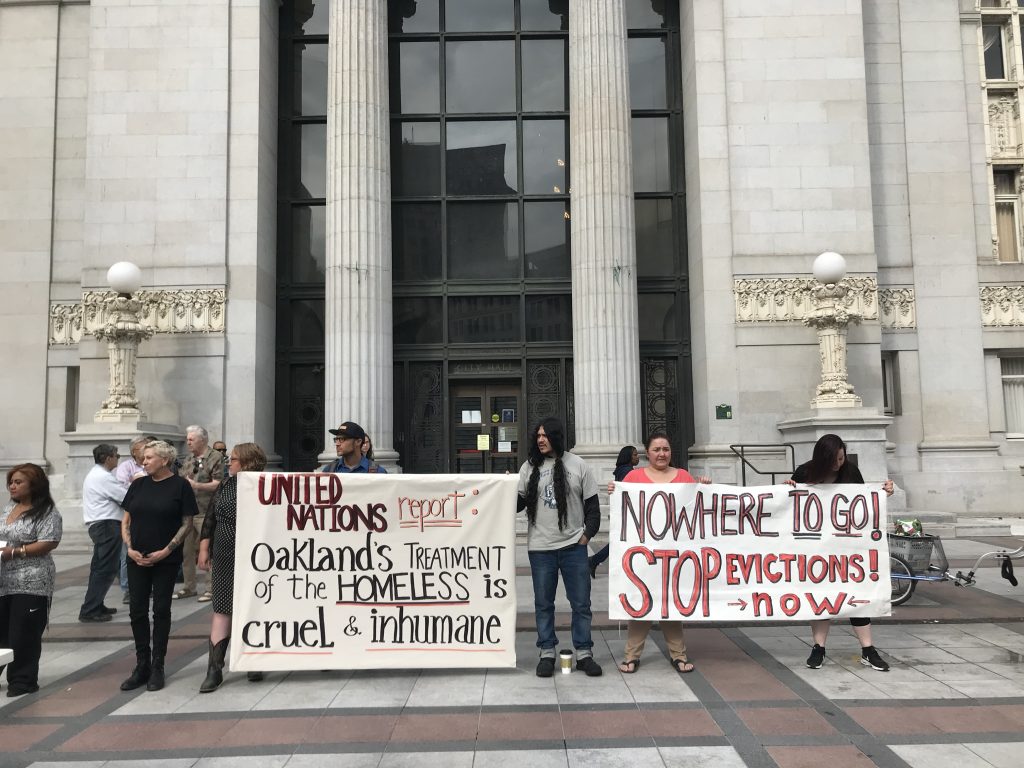
Last year, United Nations Special Rapporteur Lelani Farha made national headlines after telling the world that homelessness in the Bay Area was “cruel and inhumane.”
She drew these conclusions after spending time in the Bay Area’s tent encampments in January, meeting with homeless leaders and advocates such as Coalition on Homelessness, Western Regional Advocacy Project (WRAP), The East Oakland Collective, The Village/Feed The People, and First They Came For The Homeless.
Now, she has released the report that she came here to research. On October 18, she presented her 23-page investigation to the U.N. General Assembly, in New York. In it, she documents the “global scandal” of homeless encampments. Her research took her around the world, where she observed horrific circumstances in many different countries, such as major rat infestations in India, and children playing on piles of garbage in Ireland. San Francisco and Oakland are the only two U.S. cities singled out in her report.
“I visited California and saw firsthand the human rights’ violations being experienced by people who are homeless,” Farha writes in the report. “They are the victims of failed policies—not the perpetrators of crime.” She goes on to write that the people she observed here have no access to toilets or showers, and live in fear of being swept off the street at any moment.”
This report may shock some, but it was no surprise to people living on the streets of the Bay Area. On October 23, advocates gathered at Oakland’s Frank Ogawa Plaza to publicize the report’s findings, hoping they might galvanize new movement around the Bay Area’s long-standing humanitarian crisis.
“Refusing to accept the unacceptable is where we must begin.”
“At least at a refugee camp, you have somewhere to look forward to going, a better life,” said Tracy, a resident of The Village—an encampment in East Oakland. “Here, we have nowhere to go. We’re always afraid of when they’re going to kick us out.”
The U.N. report urges local governments to stop evicting the residents of informal settlements until permanent housing can be offered. Farha writes that in the meantime, governments should upgrade the existing encampments to have clean water, food, and support services. She also encourages localities to allow unhoused people to participate in planning these upgrades.
These informal settlements are a result of the local government’s unwillingness to provide adequate permanent housing for all citizens of the Bay Area, according to the U.N.’s findings. But the report also notes that individuals living in Bay Area encampments display resilience by surviving and creating community despite dire circumstances they face.
The U.N. report was unprecedented in its global reach, but the framework it outlines is echoed in Martin v. Boise—the recent 9th Circuit Court decision that states that criminalizing a person for sleeping outside violates their 8th Amendment rights as long as no other reasonable shelter is offered.
The report concludes with 31 recommendations to enhance the lives of over 800 million people around the world who live in informal settlements and inhumane conditions, such as redirecting private investment in real estate to support affordable housing and encampment upgrades. She concludes with a call to action:
“It is dehumanizing, demoralizing, and unjust to criminalize hundreds of thousands of people due to their housing status,” Farha writes in her report. “Refusing to accept the unacceptable is where we must begin.”
Alastair Boone is the Director of Street Spirit.
